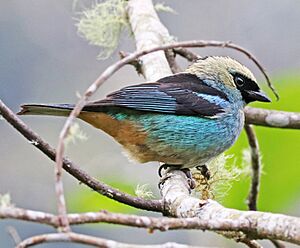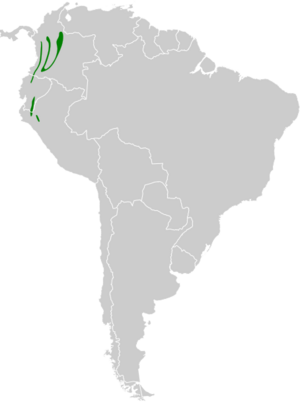Metallic-green tanager facts for kids
Quick facts for kids Metallic-green tanager |
|
|---|---|
 |
|
| Northwestern Ecuador | |
| Conservation status | |
| Scientific classification |
|
| Kingdom: | Animalia |
| Phylum: | Chordata |
| Class: | Aves |
| Order: | Passeriformes |
| Family: | Thraupidae |
| Genus: | Tangara |
| Species: |
T. labradorides
|
| Binomial name | |
| Tangara labradorides (Boissonneau, 1840)
|
|
 |
|
| Script error: The function "autoWithCaption" does not exist. | |
Script error: No such module "Check for conflicting parameters".
The metallic-green tanager (Tangara labradorides) is a beautiful bird known for its shiny, colorful feathers. It belongs to the Thraupidae family, which includes many types of tanagers. You can find this bird living in the forests of Colombia, Ecuador, and Peru. It especially likes moist montane forests, which are forests found in mountainous areas.
About the Metallic-Green Tanager
This amazing bird was first described by a scientist named Auguste Boissonneau in 1840. He found a specimen in Santa Fe, Colombia. The name Tangara comes from the Tupí word tangara, which means "dancer." This is a great name for such a lively bird!
The second part of its name, labradorides, describes its color. It comes from a French word for a type of rock called "Labrador stone" (feldspar). This rock has a shimmering, metallic blue-green color, just like the bird's feathers! So, the metallic-green tanager is named because its feathers look like this special stone.
Different Types of Metallic-Green Tanagers
There are two main types, or subspecies, of the metallic-green tanager. These are slightly different versions of the same species.
- T. l. labradorides: This is the original type of metallic-green tanager. You can find it in western and central Colombia, and also in western Ecuador.
- T. l. chaupensis: This subspecies was described by Chapman in 1925. It lives in southeastern Ecuador and northern Peru. This type looks a bit greener than the first one. It also has a lighter belly and golden-green edges on its wing feathers. It doesn't have gold on its forehead like the other type.
Gallery
 | Emma Amos |
 | Edward Mitchell Bannister |
 | Larry D. Alexander |
 | Ernie Barnes |




